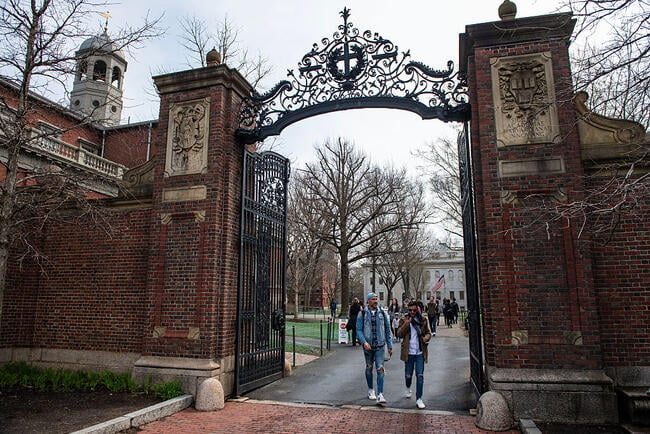You have /5 articles left.
Sign up for a free account or log in.

Harvard University’s legal battle with the Department of Homeland Security continues.
Joseph Prezioso/AFP/Getty Images
In a hearing on Monday, a federal judge put off making a ruling on whether to continue blocking President Trump’s proclamation banning Harvard international students and researchers from entering the country. The judge, Allison Burroughs of the District Court for the District of Massachusetts, agreed to decide within a week and extended an order to temporarily halt the policy until then.
The hearing came after Harvard swiftly filed a legal challenge to Trump’s directive in early June, a day after it was issued. Burroughs quickly granted a temporary restraining order and is now weighing a longer-lasting injunction.
Ian Gershengorn, Harvard’s lawyer, argued in court that the “impact of the proclamation is devastating to Harvard and its students,” Reuters reported.
Justice Department attorney Tiberius Davis argued that the president has “sweeping authority” under the Immigration and Nationality Act to bar certain foreign nationals from the U.S.
Burroughs chose to take more time to consider her decision.
But “we’ll kick out an opinion as soon as we can," she said.
The Arguments
In court filings ahead of the Monday hearing, the federal government argued that the proclamation was rooted in “concerns about national security” because of Harvard’s “noncompliance and entanglements with foreign adversaries.” The filings accused Harvard of allowing antisemitism on campus, failing to properly report discipline taken against foreign students and having links to China.
“It is facially legitimate and bona fide, in addition to being well within the President’s constitutional and statutory authority to govern the immigration system and foreign affairs of the nation. That should be the end of this case,” read the Department of Homeland Security’s opposition brief, filed over the weekend.
DHS also pushed back on Harvard’s claim that the proclamation was retaliatory and would cause the university “irreparable harm.”
“The Government, on the other hand, would be irreparably harmed by an injunction stopping the President from furthering key national interests in foreign affairs and immigration,” read the opposition brief.
Maureen Martin, director of immigration services in Harvard’s International Office, begged to differ in a court filing on Friday outlining the proclamation’s effects on students, visiting instructors and the institution.
She said before the temporary restraining order, and for some time after, Customs and Border Protection officials detained visa holders attending Harvard at Logan International Airport for enhanced security screenings. She described making repeated calls to federal officials, trying to figure out what would happen to international students and researchers already flying to Boston—and, later, where they were, while fielding calls from worried families equally in the dark.
Multiple students withdrew their requests for admission and returned to their home countries amid the confusion, she said. Other incoming international students have asked to defer enrollment, and some current international students have inquired about transferring institutions.
“At this time, Harvard cannot assure its international students and scholars that they will be able to travel to Cambridge to study at Harvard free from disruption caused by the federal government, which could occur without notice and have immediate effect,” Martin wrote.
The Background
This week’s hearing is the latest episode in a fraught legal saga between Harvard and the Trump administration.
Trump issued the proclamation barring Harvard international students from the country after Burroughs twice halted attempts by the U.S. Department of Homeland Security to strip Harvard of its ability to enroll international students.
On May 22, the department removed the university’s Student Exchange and Visitor Program certification, prompting a swift, and successful, lawsuit from Harvard securing a temporary restraining order from Burroughs.
But on May 28, Harvard received notice that it would lose its SEVP certification because of “compliance issues,” including not adequately responding to a student records request from DHS and failing to “maintain a campus environment free from violence and antisemitism.” The notice gave Harvard 30 days to refute the decision, according to court documents. In a hearing the following day, Burroughs said she’d issue a preliminary injunction to continue blocking the move while the legal process plays out and directed the university and the administration to hash out the terms.
Trump’s proclamation came a week later.
Meanwhile, Harvard continues to be locked in a separate legal battle with the Department of Health and Human Services over $2 billion in frozen federal funds. That suit is also being heard by Burroughs.





